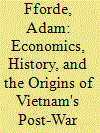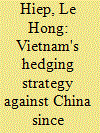| Srl | Item |
| 1 |
ID:
089517


|
|
|
|
|
| Publication |
2009.
|
| Summary/Abstract |
During the 1990s, skeptical aid donors confronted an example of development "success" in Vietnam. Understanding this requires reflection upon economic conditions in North Vietnam prior to 1975. These conditions created important prerequisites for a successful transition to a market economy, sufficiently guided by local reformists so as not to unduly threaten stability, and sufficiently reflective of realities that it could work
|
|
|
|
|
|
|
|
|
|
|
|
|
|
|
|
| 2 |
ID:
113978


|
|
|
|
|
| Publication |
2012.
|
| Summary/Abstract |
This article examines the link between the legitimation process of the Communist Party of Vietnam (CPV) and its adoption of the Doi Moi (renovation) policy. It argues that socio-economic performance emerged as the single most important source of legitimacy for the CPV in the mid-1980s as its traditional sources of legitimacy were exhausted and alternative legitimation modes were largely irrelevant or ineffective. The CPV's switch to performance-based legitimacy has had significant implications for Vietnam's domestic politics as well as its foreign policy and has served as an essential foundation for the Party's continued rule. At the same time, however, it has also presented the CPV with serious challenges in maintaining uninterrupted socio-economic development in the context of the country's growing integration with the global economic system which is experiencing instability. It is in this context that nationalism, couched in terms of Vietnam's territorial and maritime boundary claims in the South China Sea, has been revived as an additional source of legitimacy in times of economic difficulties.
|
|
|
|
|
|
|
|
|
|
|
|
|
|
|
|
| 3 |
ID:
124468


|
|
|
|
|
| Publication |
2013.
|
| Summary/Abstract |
Since the normalization of Sino-Vietnamese relations in 1991, Vietnam's China policy has been shaped by a combination of approaches which can be best described as a multi-tiered, omni-directional hedging strategy. The article argues that hedging is the most rational and viable option for Vietnam to manage its relations with China given its historical experiences, domestic and bilateral conditions, as well as changes in Vietnam's external relations and the international strategic environment. The article examines the four major components of this strategy, namely economic pragmatism, direct engagement, hard balancing and soft balancing. The article goes on to assess the significance of each component and details how Vietnam has pursued its hedging strategy towards China since normalization.
|
|
|
|
|
|
|
|
|
|
|
|
|
|
|
|
| 4 |
ID:
131265


|
|
|
| 5 |
ID:
149180


|
|
|
|
|
| Summary/Abstract |
Starting in the 2000s, there has been a rise in youth-led appropriation of public spaces in Hanoi, Vietnam. Through case studies of skateboarders and traceurs (practitioners of parkour) in two of the city’s formal public spaces, we explore and analyze the tactics deployed by these young urbanites to claim a part of the characteristically overcrowded and socio-politically restrictive public spaces of the Vietnamese capital. These case studies show that, by seeking to access issue_image_89_3_Hanoi Youth_Skateboardpublic spaces for their new activities, skaters and traceurs have had to confront multiple sets of rules, imposed by not only the state, but also corporate actors and resident-driven surveillance. We find that skateboarders and traceurs deal with these forms of control largely through small-scale, non-ideological, and non-confrontational tactics. As a result, these youth practices have become normalized in Hanoi’s public spaces. These findings broaden the discourses on everyday urbanism and social-political transformations in post-socialist urban contexts, and shed light on the ways in which contemporary youths engage with the city.
|
|
|
|
|
|
|
|
|
|
|
|
|
|
|
|